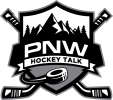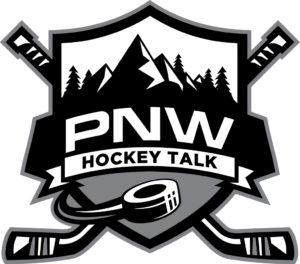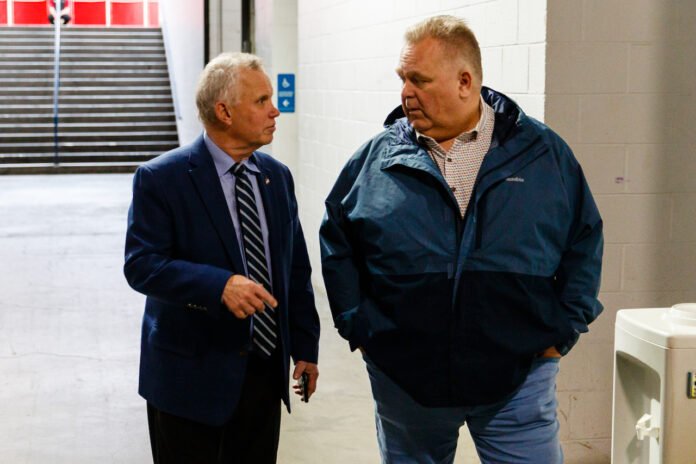
While the Portland Winterhawks 2022-2023 season has come to a close with a loss to the Kamloops Blazers in the second round of the WHL Playoffs, the organization remains in constant motion.
I recently had a one-on-one conversation with Winterhawks owner and managing partner Michael Kramer. Similar to last year, Kramer was kind enough to give me an extended amount of time to ask questions about the status, health, excitement, challenges, and all things surrounding the organization.
Last year’s article exuded excitement from Kramer when answering my questions. Going into our conversation, I was curious if he would have the same level of passion. The short answer is a resounding YES!
Kramer still has not missed a Winterhawks game in three years. While living in New York poses some logistical challenges, he hasn’t let the distance impact him from either attending a game or watching on WHL Live, even if the games start at 10:00 Eastern time. Kramer made numerous visits to the Rose City and also caught up with the team while they were on the road.
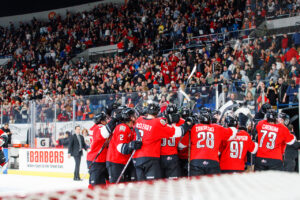
Kramer and his staff are not afraid to try new ideas.
Did everything new the organization try work? No, but that’s okay.
I give them credit for not settling for the status quo. Some of the new ideas and concepts have improved the Winterhawks, whether directly on the ice or off.
When it comes to speaking with owners, I prefer to provide the entire quote so fans can hear exactly how my question was answered. Therefore, this will slightly differ from my other articles as I will provide it in a Q&A format.
I’ll give you a warning now; this is a long article. Feel free to read part now and return later if you want to. Perhaps read it while you enjoy a nice beverage.
Josh: To get us started, how has the official third year of your ownership gone and how does it compare to the previous two?
Kramer: “Nothing compares to year one because it was the shortened COVID year. We are officially in our third season now. What I think is really kind of nice about it is we feel like we are getting back to two things. One, a little bit of normality as we put a little distance between us and the pandemic and things like that. The restrictions and all the other stuff that goes along with that. Then, as I’ve said before, we’ve had so much turnover with the business staff, both voluntary and involuntary. We feel really, really good with where we are with the business team at this point in time. They are at a point where they’ve been through some of the stuff we are experiencing. They’ve learned from it in year two and are building off it in year three. You can really see some of those positive results coming out in the second half of this year. We are pretty excited about how it should be going forward as we continue to build.”
Last year you mentioned you were pretty involved with the organization on a day-to-day basis. Are you more or less involved than before?
A: “You might need to ask the Winterhawks staff. (He said with a laugh). My guess is that I’m probably equally as involved as I have been before. I was talking about this with someone else today. I’m not sure if it is because I have to be involved, but rather I enjoy being involved.
It’s not that I’m pushing, saying this needs to be done or that needs to be done there. We have a really, really good team of people. I think we have the best hockey staff and operations in the league and the whole CHL, frankly. There’s not much that I need to do there, but a lot I can learn.
Then, on the business staff, we really put together a great business staff. They are doing some great things. Again, I like to help where I can help, but they are really the ones driving the bus. I’ll be there when they need me.”
How has attendance been from your perspective? Do you feel you are getting more people into the VMC compared to last year?
A: “The first thing our attendance says to me is, ‘We have to be doing something right.’ We were up about 44 percent, I think this year in terms of attendance year-over-year. That was driven mostly by the back half of the year compared to the front half of the year. That tells me we are doing something that is making the fans excited and want to come out and see us play. That makes me feel really good on that side of things.
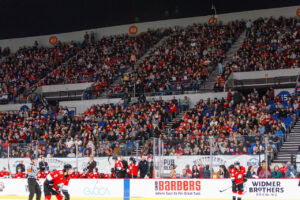
I don’t think we are where we can be though in terms of attendance. I think we will finish the year averaging just over 4,500 fans per game. That is kind of a number where the whole atmosphere, in my opinion, the VMC changes. It is around 4,000 to 5,000 that once you cross over those numbers, the electricity in that building really, really changes. We’ve had a couple of sellouts this year. We’ve had a couple of 7,000-plus games as well. That is a really exciting place to watch a game. From my standpoint, it is exciting to have that happen, and it really helps the boys. I talk with them, and they love the environment when the building really gets going, and everyone is having fun in the stands.
Again, I’ve said this since Day One, Portland is more of a hockey town than everyone appreciates. It is our job to expose people to hockey so they can get in there and see the product that is out there. I think we have a lot of room to grow still.”
You’ve stressed how important community involvement is to you. How has that been going so far this year?
A: “It’s gone well, but we have so much more work to do on it in my mind. We have a lot, a lot more work to do on it. I’ve always said, ‘We have to earn the privilege to play in front of fans.’ That means we need to reach out to them. We have to get them excited about coming. That’s where we spend a lot of time talking about and how we attract those fans to come in and see our product. It is absolutely unique in the world of sports having a major junior team.
I was in the stands a couple of games ago (earlier in April) during the first round of the playoffs. You listen to the fans, and they want the fights, and they want the aggressiveness, and want all this. Then you start saying, I wonder if they realize that these boys are really 16-20 years old? You’ve got somebody yelling or cursing at one of the players, and I think, ‘These are young men that (are) out there.’ It is a special, special sport, though.
I’m proud of what we’ve done in the community. We’ve only started to scratch the surface. We want to continue to do more and more of that. The fan fests that we’ve had, integrating the Junior Winterhawks, making sure everybody knows that we are out there, and it is important for me to support local community efforts. All of those things and more will need to get ramped up.”
A lot of talk during the season from fans was around the quality of the streaming service. I know you are a user of the product. How do you feel about WHL Live?
A: “I don’t believe I’ve missed a game yet in three years. I actually have either been at or watched every game since I became an owner. I’m definitely a user of the streaming service. Particularly being on the east coast, I’m watching a lot of games that start at 10:00 pm and end around 1:00 in the morning.
Obviously, I’m very thankful to have it, and loving having it. Frankly, I think the quality depends from arena to arena. I think some arenas have got it more figured out than others in terms of the quality of the streaming and in terms of the lighting within to help see. There are others that have some issues with the sound. I’m happy to have it as always. With everything, there is more work to be done with it. I wish I could just watch it on ESPN, but we haven’t been able to get ESPN to pick us up yet.
That said, at least in the local markets, our TV partners have been very, very excited about what we’ve been able to do this year. The viewership on KOIN and some of the other CW stations has been very high this year. Again, you should talk to them about it, but I actually think they are pretty happy with it, so that is always helpful.
Then, in fairness, when I do watch the streaming, I’m one of those guys that I always have to go with Nick (Marek, Winterhawks play-by-play voice). I’m always listening to him when we are away too, so I have to listen to the away announcing. Sometimes that isn’t as good of a quality as the home side. That said, I’ll take Nick on the call and a little crackling over Seattle’s announcer, who comes across clear.”
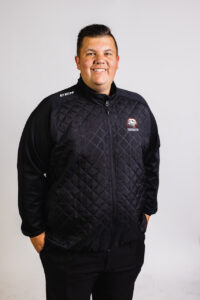
How do you feel Portland’s rink does with the streaming?
A: “I’m going to be biased here, but I actually think we do a really good job here with our production. I think it is one of the better productions. Who knows, a bunch of people on social media will be beating on me once you put this out there. I do think it is one of the better ones, though.
Frankly, we talk about this a lot, and I don’t want to use this as an excuse, but we have an old building. That does put some restrictions on our ability to do some things with the stream. That impacts the camera angles and where we can put cameras or other features. We are trying to work within the context of what we have. I’m trying to work with the building and the city and the RIP City guys to enhance that capability and the product we are putting out there. Again, I know personally, I would be very angry if we didn’t have the streaming. If I couldn’t see the games at all, and I know a lot of fans are in this spot too, I would be pretty upset.
What about games back in the Moda Center? Where are things there with the ice plant and possibly playing back in that building?
A: “I hope to be able to do it for sure. However, it really is a function of their ice plant. It is not our choice. It is not a decision that we made. They can’t make ice, and we can’t play without ice. It just isn’t an option that is out there today.
We do talk to them all about it. They are going to go through some renovations there. Hopefully, at that time, they’ll get some ice plants in there.
There are a handful of games that makes sense to have over there. I think we could make that building electric.
I would love to have it happen, but no ice, no hockey.”
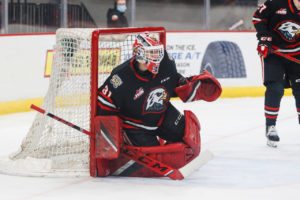
What is your stance on trying to host a Memorial Cup or possibly World Juniors, especially now that Saginaw, Michigan, was awarded the 2024 Memorial Cup?
A: “100% I do, absolutely. I’m thrilled to hear that Saginaw got it. I was talking with those guys while they were bidding for it. I personally spent a lot of time with the CHL talking about why it is important and why United States-based teams can host. We would absolutely love to host the Memorial Cup. Given the right circumstances, we are going all for it. The first opportunity we will have is three years. I don’t know if we will be able to get it done for that or not, but I’m definitely, definitely focused on hosting.”
How has your relationship been with the city of Portland? Has it changed in the last year?
A: “You should ask them as well (He said with a laugh). We sure talk a lot, that’s for sure. I do think it is good, honestly. It is a difficult three-way discussion that is always had when we sit down. The building is an absolute gem, but it is very old. There is no hiding that fact. We need to make upgrades to it from an infrastructure standpoint. We need to make upgrades from a fan standpoint. I think the city gets that, but it is just when and how do we pull that all together. They’ve been very good about including us in the thinking on that side of it. One of my partners is the largest operator of arenas in the world. We can bring a lot of experience and knowledge and help to that process.
The other thing that does help, frankly, is our increase in attendance. One of the things as I understand it, it is important to the city that this building is used. They want people to come through it, see it, and experience the building. There are very few buildings that have their own name and not a sponsored name. In the arena world, from a structural perspective and architectural standpoint, it is an absolute gem. Our ability to sort of bring more fans, bring more activity, that is something that is really helping them get comfortable that this is something they should be focused on.
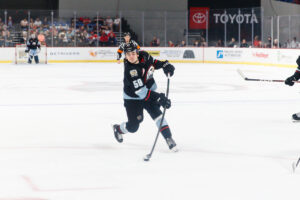
With respect to RIP City, we are constantly in dialogue with them both as a landlord but also as a partner. One of the things we’ve done is reach out to all the different sports teams. We speak a lot and talk to the Timbers, Thorns, Pickles, Hops, and Trailblazers. There is a really great community there who is trying to help each other. We specifically ask about what the Trailblazers are doing since they are next-door neighbors. I’m constantly working together with them to work better. For example, we changed the start times of games from 7:00 to an earlier start so we don’t have as much overlap with next door. I want the experience to be as friendly as possible to the people coming to our games.
Where do I want to get? I want to get more fans than them (he concluded with a laugh)”
You mentioned possible upgrades. Are you able to share any you have planned or are hoping for?
A: “Oh, I’ve got a lot of ideas. I’ve got a lot of very specific ideas. Again, we are starting to see some of them. We did some stuff with the beer garden, the areas behind the benches, and other things like that. I’m hoping that we can roll out a few more things, though. In the second half of the year, we started to have some rooms underneath the stands. Those were created for a club lounge or other things like that. There are a lot of things I want to do, though. I feel like we have a lot of great bones to the arena. We just need to upgrade those going forward.
These things sound so stupid, but last year we were able to work with the city to replace or reupholster 75% of the seats. It seems silly that we have to do that, but it goes a long way with even small things like that. We put some cupholders in a few seats. Now we finally have at least a few seats with cupholders on them. It is things like this that aren’t lost on us. We are restricted on what we can do. The key, and what we’ve talked about as a staff, is we are not going to let that get in the way. Let us know what cards we have and we are going to play those and get creative. I’m not afraid to try different things. Hopefully, the city in the next couple of years will sort of work with us to do some pretty significant upgrades in the VMC.”
What is the status of WAHA? Are they healthy? Seems like a lot of players are utilizing that scholarship fund lately.
A: “The simple answer is yes. There are a lot of guys that are taking advantage, perhaps one of the highest years ever in terms of the number of people that are going to college. Obviously, that is a big cost, but it is a sense of pride for us. We love that guys are going to school. WAHA is doing well. We had the benefit of a couple of private donors that donated some money to help facilitate that. Stan (Girt) does a great job with that whole program. It is all going well. That said, again, it is going to be a common theme. We have a lot more to do on that side of the organization.
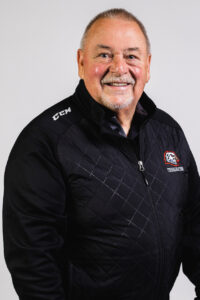
Literally, we had a conversation today (earlier in April) talking about, ‘Yeah, we’ve got these guys going to college, some going pro, some moving on.’ These are 16, 17, 18, and 19-year-old kids. We are looking into how we could get them career counseling or exposure to other things outside of hockey, regardless of what their passion is. I wish every one of them would be able to fulfill their dream of playing in the NHL. Some of them aren’t, and even those that do (play in the NHL), after their NHL career is over, they will have something else to do. We want to be part of that development for these guys. We want them to see what else is out there for them from a career perspective. So we have some ideas on how we deal with that. We’ve talked with a lot of the local colleges. All of them have been supportive of how we could work together to really just give these kids every tool that they need to be successful in whatever they are going to do.”
Does this include while they are still in Portland and not just after they age out from the WHL?
A: “Every one of our kids goes to school. We have high school kids go over to Sunset High School (located in Beaverton, Oregon). I think Sunset High School might lead high schools in America when it comes to pros coming out of there compared to any other high school, more NHL players, that is.
Those that have graduated high school, we have them go to college classes. They have those classes in the morning. I think we are one of the few teams where everybody has to go to school. When they leave us, when a 20-year-old leaves us, they will have a chunk of college credits down. It keeps them, I think, engaged.”
How do you feel about teaching the players other topics, such as personal finance and other life skills?
A: “One of the things that we’ve done is bring people in specifically to help them with those. A substantial portion of our team is Canadian. They don’t have a US banking account, so we show them how to get a checking and savings account.
One of the things that we are talking about is that these kids, when they are living at home, they are getting taken care of. Then, they come here, and they have billet families, which is absolutely awesome. They also have Richy (Campbell, Winterhawks athletic trainer and strength and conditioning coach) and all of the hockey operations staff taking care of them. Finally, they go off of the AHL, NHL, or college, and they are living in an apartment by themselves, and they don’t know how to cook. We’ve talked about getting them cooking classes or basic things like that.
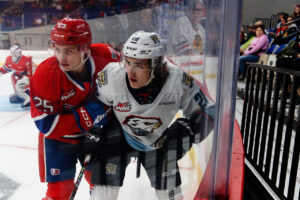
We really, really believe it is our job, and we take great pride in being one of the top development programs from a hockey perspective. However, development goes well beyond hockey. We have a responsibility to these boys since we are an important part of their lives. A lot of their growing up is done here. The schooling, growing up, playing hockey, etc., I always say, ‘All of us have had crazy dreams. I want to be an astronaut, rock star, or something else.’ Do you know what the difference is? We have 24 kids here in Portland that all have this dream of being an NHL player. You know what? We’ve got 24-plus kids that are on the verge of accomplishing their dreams. It is our job to support them doing that in any way we can.”
One of the unique things about Portland and Mike Johnston’s philosophy is traveling to road games a day early to minimize bus legs or other road woes. Those costs add up and hit your pocketbook as an owner. However, this practice is something you’ve kept since you took over. Is this another example of how you want to make sure the players have the best experience on and off the ice?
A: “Absolutely, it is a benefit both on and off the ice. I get a chance to talk to the parents after they’ve committed. Mike (Johnston) and Kyle (Gustafson) and Mike Coflin (Winterhawks assistant to the general manager and director of scouting), and Greg (Sampson, director of hockey operations and U.S. head scout), are talking to these parents before they commit. You know what, it is important to the parents. Mom wants to know if her kid is getting good food. Mom wants to know if the kid gets hurt, they are going to get good medical attention right away. All of these types of things add up. We look at it as if it is our responsibility to develop these kids. However, we also have a responsibility to the parents to be good partners to them.”
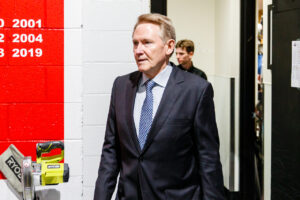
How about an update on the Winterhawks Skating Center? How has that changed since we spoke last year? Are there any updates you can share?
A: “It has been good overall. We are thrilled to have that as part of the family. On that, we think it is really important. One of the big things that we’ve been trying to do, and continue to try to do, is tie it all together.
Historically, it has been two separate organizations. We want the Tom’s Tykes program and other programs like that to help provide that exposure and try hockey. Even more broadly speaking, ice sports in general. Not everyone is going to be a hockey player. Maybe someone wants to be a figure skater, so we want to be able to get kids and adults excited about all the ice sports that are out there.”
How do ideas get from concept to implementation? Does it start with you, the marketing office, or the league? Can you help fans understand that process from an idea to what they see online or at the rink?
A: “I have to give Jeff McGillis (Winterhawks chief marketing officer) a lot of credit for what is going on. We are absolutely fortunate to have Jeff on our staff. Jeff has added so much to the organization. The reality is, I don’t think the league dictates to us that we have to do too much. I’m not 100% sure, though. Jeff is at the center of everything. Where does an idea ultimately germinate from? If you were to talk to him, he would tell you that I’m talking with him on a regular basis. We are always talking, but half the time is just chit-chatting, and something comes up. One of us will say we saw something, or ‘Hey, let’s try this!’ I don’t know where it all comes from, but we are fortunate to have Jeff. He’s driving all of this stuff that you’re seeing happen. Very little happens in this organization without Jeff or Mike Johnston being involved.”
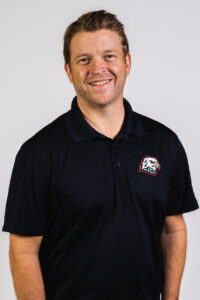
As the owner, how has your relationship with the league changed? You have a new, fresh voice in the Board of Governors meetings. How have you seen things change from that perspective?
A: “We think we are highly constructive members who are constantly adding value (He once again said with a laugh). You might need to ask some of the owners, though. The way we think about it is, we are definitely newer governors. As the new guys at the table, we have to learn and understand what is going on and why it is going on. We are trying to add value where we can. I think both Kerry (Preete, fellow Winterhawks owner and managing partner) and I are now at this for our third season, so we are getting a lot more comfortable. We’ve developed direct relationships with a lot of the other owners, governors, and league members. We have more of a platform and credibility to speak.
I can tell you I’ve been to about half of the other arenas in the league. When I go, I try to meet with other owners personally. Then, we have the Board of Governors meetings, where I’m also developing relationships. We talk to people in the OHL (Ontario Hockey League) and QMJHL (Quebec Major Junior Hockey League). I think we are veracious consumers of insight. I want to know what everyone else is doing. I want to think about it, process it here, and then do it better in practice and motion if it makes sense for Portland.”
What is the biggest challenge facing your organization right now?
A: “I think there are a couple of things out there right now from a macro and micro perspective. From a macro side of things, I would say one of the biggest challenges is how prominent the NCAA is becoming. What we need to do as a league is we need to figure out how to become more prominent in the United States. The CHL and WHL are still the dominant developers of NHL talent, and we need to maintain that. As the NCAA is evolving, we want to be able to make sure we are evolving at the same time. We need to maintain our share of that, if not grow it. We have two things to work on. We have to defend our position in Canada and grow our position in the United States.
On the micro side, our facility is a big challenge for us. I’ve said that many times. We are not going to use that as an excuse. That means we have to get more creative about what we are doing and how to do it. I’m trying to make our facility not be a negative but trying to attract the fans to come in despite the facility or for what we have in place.
In year three, what are you most proud of or most excited about right now?
A: “I continue to be proud of the hockey operations side. Mike (Johnston), Kyle (Gustafson), Lisa (Hollenbeck), Mike Coflin, and Greg Sampson, who does a great job on the U.S. side of things, and all our scouts. What they are doing on that side is incredible. I don’t know the exact statistic, but we are the only team who has won 40 or more games six years running (this statistic is correct). That is no small feat. To have that level of consistency is really, really impressive in junior hockey. We are excited that we continue to put a quality product on the ice.
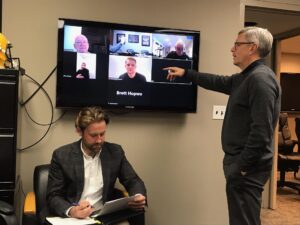
I’m absolutely most impressed by what these boys do and the quality of people we are bringing through the organization. All the things we’ve talked about already, that makes me proud. I’m honored to be part of their development, as little part of it as I am. Everything needs to revolve around that side of it.
You see the impact of it when we honored the 1983 Memorial Cup Team. I got a chance to meet with the 12 guys that came out. Just how they viewed their time in Portland and their experience, it really shows the importance of what we are doing here. We all talk about being the class of whatever year in high school. For them, this is their graduating class. I thought it was such a wonderful experience to be able to interact with all those guys.
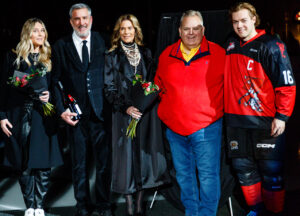
One of the things we are really focused on is re-engaging our alumni. Not only the Cam Neely’s of the world but the guy that went off and became a doctor or fireman or another non-hockey profession. From their standpoint, this is their alumni class and who they are connected to. We created a whole new wall within the locker room that celebrates the success of everybody.
Then, obviously, I’m really proud of the fact that we are able to get more fans to come through the gates. I do believe that we are making a difference. I get beat up a lot on social media sometimes, but when I’m at the games, a lot of fans come up to me and say positive things. That makes me feel good as an owner.”
Anything else that’s happened in the last year you feel the fans should know about or hear directly from you?
A: “I’m biased, but this is the greatest in-person spectator sport in my mind. The quality of the game that is played in that arena every night is incredible. It is a really unique opportunity to see some of these guys before they play in the NHL. Some of them are already prominent, but they are right on the verge of getting (to the NHL). We’ve got a couple of guys that are going to be selected pretty high in the NHL Draft this year. You don’t have the opportunity to always see that and be part of them growing up. To me, that is something I want Portland to engage in because it is so unique. We as a city are helping raise these NHL players.”
